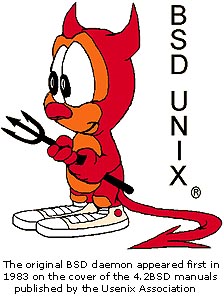BSD UNIX stands for Berkeley Software Distribution UNIX, a version of UNIX that originated many common UNIX features such as the vi editor, C shell, and TCP/IP networking.
BSD UNIX was developed in the 1970s at the University of California at Berkeley, which licensed the UNIX operating system from AT&T and then made a number of modifications and enhancements. BSD UNIX is one of the most popular versions of UNIX in use today, the other being UNIX System V and its variants.
BSD UNIX formed the basis of the SunOS from Sun Microsystems.
Sun later combined features of both BSD and System V into their popular Solaris operating system. Another variant of BSD is the FreeBSD operating system.

In March 1978, Bill Joy, who studied at the University of California at Berkeley, released the first free version of UNIX operating system which is now known as BSD UNIX. (Berkeley Software Distribution)
After having been involved in the BSD project, Bill Joy co-founded Sun Microsystems in 1982 and led the technical strategy of the company. He designed Sun’s Network File System (NFS), parts of the SPARC microprocessor architecture as well as basic pipeline used in all of Sun’s SPARC microprocessors. Later, he was the co-author of the specification for the Java programming language. In 1998, Bill was appointed as Chief Scientist of the company.
Compatibility
Some BSD operating systems can run much native software of several other operating systems on the same architecture, using a binary compatibility layer. Much simpler and faster than emulation, this allows, for instance, applications intended for Linux to be run at effectively full speed. This makes BSDs not only suitable for server environments, but also for workstation ones, given the increasing availability of commercial or closed-source software for Linux only. This also allows administrators to migrate legacy commercial applications, which may have only supported commercial Unix variants, to a more modern operating system, retaining the functionality of such applications until they can be replaced by a better alternative.
BSD Descendants
Several operating systems are based on BSD, including FreeBSD, OpenBSD, NetBSD, MidnightBSD, GhostBSD, Darwin, and DragonFly BSD. Both NetBSD and FreeBSD were created in 1993. They were initially derived from 386BSD (also known as “Jolix”), and merged the 4.4BSD-Lite source code in 1994. OpenBSD was forked from NetBSD in 1995, and DragonFly BSD was forked from FreeBSD in 2003.
BSD was also used as the basis for several proprietary versions of Unix, such as Sun’s SunOS, Sequent’s DYNIX, NeXT’s NeXTSTEP, DEC’s Ultrix and OSF/1 AXP (now Tru64 UNIX). NeXTSTEP later became the foundation for Apple Inc.’s macOS.
Download FreeBSD
You can download FeeBSD here.